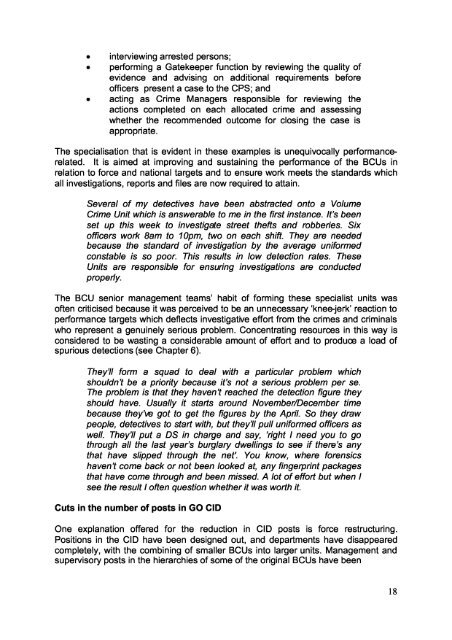LOSING THE DETECTIVES: VIEWS FROM THE ... - Police Federation
LOSING THE DETECTIVES: VIEWS FROM THE ... - Police Federation
LOSING THE DETECTIVES: VIEWS FROM THE ... - Police Federation
You also want an ePaper? Increase the reach of your titles
YUMPU automatically turns print PDFs into web optimized ePapers that Google loves.
•&interviewing arrested persons;<br />
• performing a Gatekeeper function by reviewing the quality of<br />
evidence and advising on additional requirements before<br />
officers present a case to the CPS; and<br />
• acting as Crime Managers responsible for reviewing the<br />
actions completed on each allocated crime and assessing<br />
whether the recommended outcome for closing the case is<br />
appropriate.<br />
The specialisation that is evident in these examples is unequivocally performancerelated.<br />
It is aimed at improving and sustaining the performance of the BCUs in<br />
relation to force and national targets and to ensure work meets the standards which<br />
all investigations, reports and files are now required to attain.<br />
Several of my detectives have been abstracted onto a Volume<br />
Crime Unit which is answerable to me in the first instance. It’s been<br />
set up this week to investigate street thefts and robberies. Six<br />
officers work 8am to 10pm, two on each shift. They are needed<br />
because the standard of investigation by the average uniformed<br />
constable is so poor. This results in low detection rates. These<br />
Units are responsible for ensuring investigations are conducted<br />
properly.<br />
The BCU senior management teams’ habit of forming these specialist units was<br />
often criticised because it was perceived to be an unnecessary ‘knee-jerk’ reaction to<br />
performance targets which deflects investigative effort from the crimes and criminals<br />
who represent a genuinely serious problem. Concentrating resources in this way is<br />
considered to be wasting a considerable amount of effort and to produce a load of<br />
spurious detections (see Chapter 6).<br />
They’ll form a squad to deal with a particular problem which<br />
shouldn’t be a priority because it’s not a serious problem per se.<br />
The problem is that they haven’t reached the detection figure they<br />
should have. Usually it starts around November/December time<br />
because they’ve got to get the figures by the April. So they draw<br />
people, detectives to start with, but they’ll pull uniformed officers as<br />
well. They’ll put a DS in charge and say, ‘right I need you to go<br />
through all the last year’s burglary dwellings to see if there’s any<br />
that have slipped through the net'. You know, where forensics<br />
haven’t come back or not been looked at, any fingerprint packages<br />
that have come through and been missed. A lot of effort but when I<br />
see the result I often question whether it was worth it.<br />
Cuts in the number of posts in GO CID<br />
One explanation offered for the reduction in CID posts is force restructuring.<br />
Positions in the CID have been designed out, and departments have disappeared<br />
completely, with the combining of smaller BCUs into larger units. Management and<br />
supervisory posts in the hierarchies of some of the original BCUs have been<br />
18
















